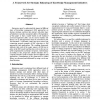Free Online Productivity Tools
i2Speak
i2Symbol
i2OCR
iTex2Img
iWeb2Print
iWeb2Shot
i2Type
iPdf2Split
iPdf2Merge
i2Bopomofo
i2Arabic
i2Style
i2Image
i2PDF
iLatex2Rtf
Sci2ools
106
click to vote
HICSS
2003
IEEE
2003
IEEE
A Framework for Strategic Balancing of Knowledge Management Initiatives
Enterprises need to understand the impact of different types of knowledge management (KM) approaches on business strategy, and how they interact with other types of initiatives to produce synergistic effects. The hypothesis of this paper is that a model based on the balanced scorecard approach (BSC) can be used to balance the diverse set of KM approaches that are described in the KM literature. A literature study has been carried out connecting general examples of BSC objectives to KM approaches and applications. The resulting framework indicates that each of the major aspects of KM has its place in the BSC model, and thus has a role in the success of the company from a strategic viewpoint. A KM strategy according to this perspective should articulate how a company intends to strike a balance between different KM approaches. Contributions of the framework to related theory are discussed and illustrated by using a rich case from literature.
Balanced Scorecard Approach | Biometrics | HICSS 2003 | KM Approaches | KM Literature | System Sciences |
Related Content
| Added | 04 Jul 2010 |
| Updated | 04 Jul 2010 |
| Type | Conference |
| Year | 2003 |
| Where | HICSS |
| Authors | Jan Aidemark, Håkan Sterner |
Comments (0)

